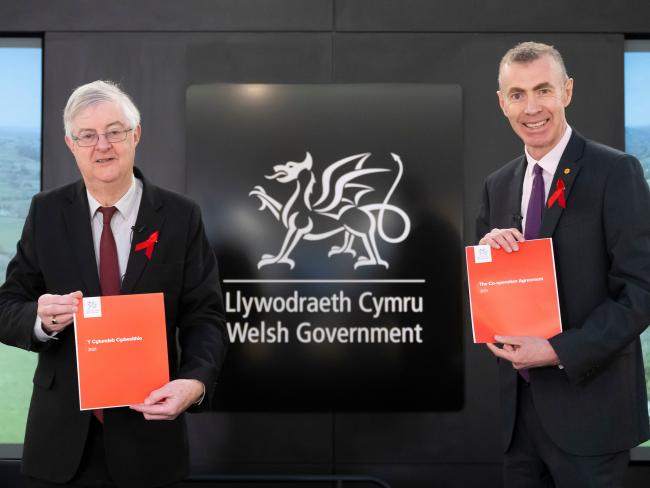2 February 2024

First Minster Mark Drakeford and Plaid Cymru leader Adam Price sign a Co-operation Agreement, Cardiff, 1 December 2021. Photo welsh_government via Flickr (CC-BY-NC-ND 2.0)
The Welsh government has consistently failed to persuade Welsh workers that its agenda for even greater devolution is good for them. A recent report by its own commission is further evidence of that – and of its misguided ambition.
The Welsh government established the Independent Commission on the Constitutional Future of Wales in November 2021. The label “independent” is inaccurate and misleading. The objectives set by the Welsh government assumed that devolution is a good thing and precluded an end to it.
The commission’s objectives were, “to consider and develop options for fundamental reform of the constitutional structures of the United Kingdom, in which Wales remains an integral part, and to consider and develop all progressive principal options to strengthen Welsh democracy and deliver improvements for the people of Wales.”
Bias
Despite claiming to consider options for the constitutional structures of the United Kingdom, this excludes an end to devolution. The commission itself seemed to have a similar bias towards continued devolution.
One of the two co-chairs, Rowan Williams, was previously on record as favouring devolution and in 2022 declared that “the UK government is a problem for Wales”. The other, Laura McAllister, has long been involved with devolved government in Wales. And although no longer a member, she was once a Plaid Cymru candidate.
Rejected
The commission’s interim report published in December 2022 explicitly rejected both maintaining the status quo and “unwinding” devolution. Neither option was to be given further consideration.
That was disappointing but hardly surprising, given that the Welsh government had in effect told the commission what to find. Instead it decided to only look at options giving more powers to the Welsh government.
'The commission only looked at giving more powers to the Welsh government.’
The commission selected only “enhanced devolution”, “federal structures” and “independence” for consideration in the final report. And the federal structures choice went beyond Wales – in effect telling the UK government how it should work.
The final report was published on 17 January 2024, looking further into the selected options. The commission claimed that most people do not understand how their country (meaning Wales) is governed, nor who is responsible for what.
The report asserted that many people feel that the system is not listening to their concerns and that they lack the information and understanding to discuss alternative constitutional options. It claimed that there is a perception of powerlessness and distance between “citizens” and government.
Arrogance
These and similar statements in the report clearly show the arrogance of the commission and the Welsh government. The Senedd, the Welsh Parliament, takes decisions and refuses to listen to those workers who are opposed to those decisions. What the commission really means is that people’s views do not fit into their own preconceptions about constitutional change.
The final report says that it is important for supporters of the Union to have their proposals discussed and scrutinised in an open and constructive manner. Yet that’s exactly what the commission rejected as unworthy of consideration.
Contempt
Throughout the final report there is a contempt for workers, suggesting people are unable to understand how they are governed despite the failure of devolution. And its answer to the failures of the devolved government is more devolution.
The Senedd shares that contempt. Workers in Wales know that, which is why turnout for Senedd elections is so low.
The commission was however forced to admit that when asked about their overarching priorities, people rank constitutional change below matters such as the NHS, education, and other public services. These concerns are in those areas where the Welsh government is failing the people of Wales.
